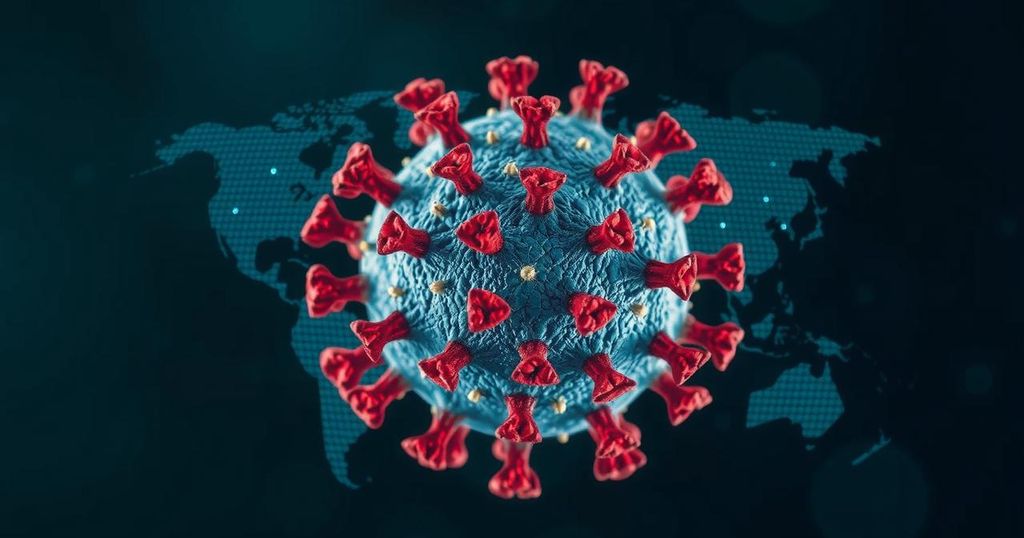Weather
AFRICA, AFRICA CENTRES FOR DISEASE CONTROL AND PREVENTION, BURUNDI, CENTRAL AFRICA, DEMOCRATIC REPUBLIC OF CONGO, DISEASE, DISEASE OUTBREAK, DR CONGO, DRC, KENYA, MEDICINE, RAIN, RWANDA, TRAVEL ADVISORY, UGANDA, WEATHER FORECAST, WEST, WHO, WORLD HEALTH ORGANIZATION
Sofia Rodriguez
0 Comments
Mpox Outbreak: Understanding the Disease, Symptoms, and Global Impact
Mpox, formerly known as monkeypox, is a viral disease currently causing significant outbreaks primarily in parts of Africa, particularly the Democratic Republic of Congo. Symptoms include fever, headaches, and a rash that can lead to severe illness. The disease spreads through intimate contact and can be fatal, particularly among young children and those with weakened immune systems. Renewed global focus is necessary for vaccination efforts and public health strategies to manage the crisis effectively.
Mpox, previously known as monkeypox, is a viral disease primarily identified in tropical rainforest areas of West and Central Africa, with significant outbreaks reported in the Democratic Republic of Congo (DRC). Initially transmitted from animals to humans, mpox can now spread among individuals. Symptoms typically include fever, headache, swollen lymph nodes, back pain, and muscular aches. Following the fever, a rash can develop, often starting on the face and disseminating to other body parts, particularly the palms and soles. The illness generally resolves within 14 to 21 days, although severe cases may result in complications and fatalities, particularly in vulnerable populations such as children and immunocompromised individuals.
Currently, mpox is manifesting in regions such as Burundi, Rwanda, Uganda, and Kenya, alongside ongoing cases in the DRC where the Clade 1 variant is prevalent. The Africa Centres for Disease Control and Prevention has reported over 14,500 infections and more than 450 fatalities from mpox since the beginning of 2024, marking significant increases in both infections and deaths compared to the prior year. The disease spreads through intimate contact, respiratory droplets, and contaminated objects, establishing sexual transmission as a primary method of spreading in recent outbreaks. Health experts advise against close contact with infected individuals and emphasize the importance of hand hygiene to curb transmission risks.
Vaccines for mpox are available but are typically limited to at-risk populations, raising concerns about access and funding for broader vaccination efforts. The situation calls for increased global response to prevent further spread, especially as the WHO has labeled the mpox outbreaks a public health emergency of international concern. Emphasis has been placed on collaboration between governments and health organizations to manage the crisis effectively and to ensure the necessary medical resources reach affected areas.
Mpox is a viral infection that, while closely related to smallpox, is generally considered less severe. The disease has historically been endemic to certain regions of Africa, but recent outbreaks have raised alarms about its potential spread beyond its traditional boundaries. The economic ramifications and public health implications of mpox outbreaks necessitate urgent international attention, particularly given the recent emergence of more aggressive strains like Clade 1b. The response to these outbreaks is complicated by factors such as limited vaccination availability and disparities in healthcare access among vulnerable populations.
In summary, mpox is a re-emerging viral disease causing significant concern in Africa, particularly in the DRC and surrounding nations. The transmission dynamics indicate a troubling trend, especially concerning sexual contact among infected individuals. Current health recommendations underscore the urgency of isolation practices and preventive measures to minimize the spread. There is a clear need for enhanced international cooperation to manage outbreaks, fund vaccination efforts, and protect vulnerable communities from the impacts of mpox.
Original Source: www.bbc.com




Post Comment